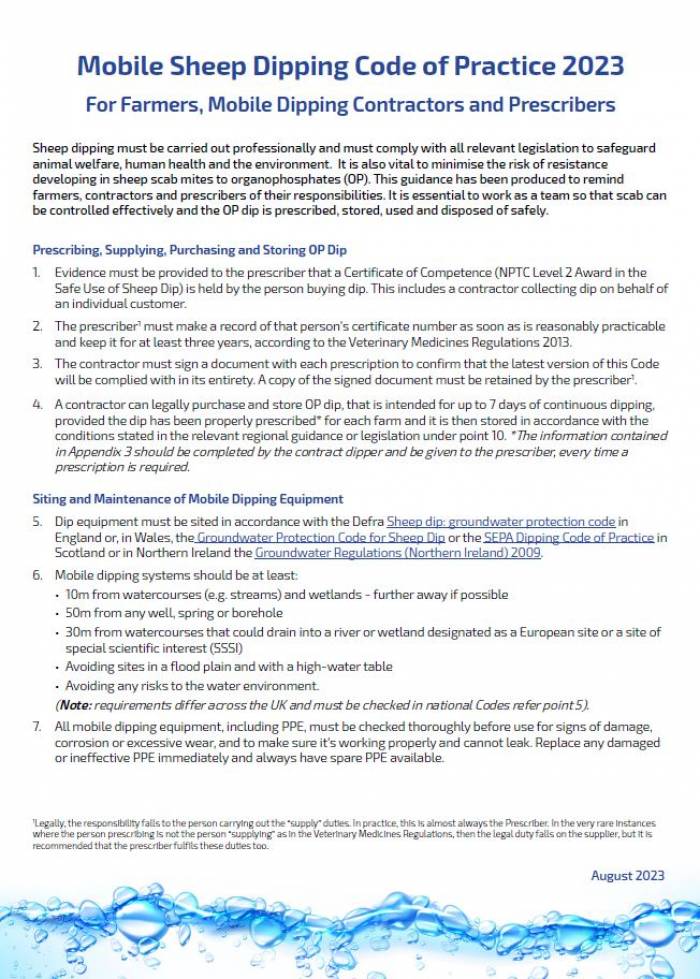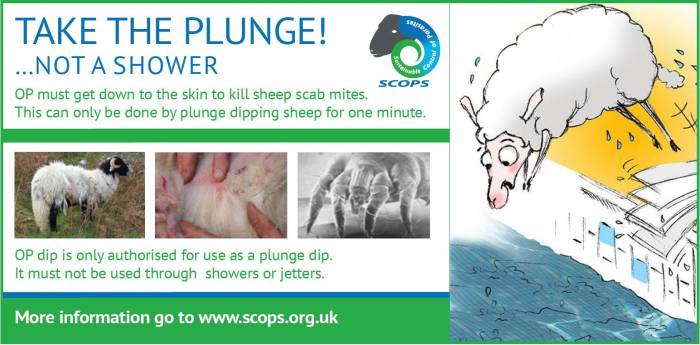7th September 2023
Speakers at a SCOPS-led webinar today (Thursday 7th September 2023) urged mobile sheep dippers, farmers and prescribers to make themselves aware of updates to the cross-industry Mobile Sheep Dipping Code of Practice – to ensure the ongoing effectiveness and safe use of organophosphate (OP) dip, particularly for the control of sheep scab.
Opening the online event on behalf of SCOPS, independent sheep consultant Lesley Stubbings said it was ‘good news’ sheep scab mites resistant to injectable 3-ML endectocides had been proven to be susceptible to OP dip but, therefore, it was more important than ever to use OPs properly and protect them for the future.
Resistance to endectocides (not yet widespread, but rising), increasing cases of sheep scab and falling numbers of farms with dipping facilities/licences have all led to more producers using mobile sheep dipping services. Ms Stubbings said: “The increased use of professional mobile dippers is a positive move for the industry – but means sheep farmers, contractors and prescribers all need to know what is expected of them to ensure this option is effective in treating sheep, safe for human operators, and does not negatively impact the environment. That is why the Code of Practice was introduced in 2021 and has now been updated to provide further clarity.”
Stephen Dawson of the Animal Medicines Training Regulatory Authority (AMTRA) said legislation around prescribing of OP dip very clearly outlined what information the prescriber had to collect from and provide to the owner of sheep being dipped – but therefore meant contractors as an intermediary were ‘not particularly well covered’. The updated Code of Practice, which the Veterinary Medicines Directorate (VMD) had given its approval to, provides much-needed clarity for contractors. It also means contractors willing to sign up to the code can now purchase up to seven days’ supply of OP dip for a week’s worth of dipping work on multiple farms.
Mr Dawson said: “For the first time, the code clarifies what is expected of contractors and what the interaction between a contractor, as an intermediatory, and the prescriber should entail. We are very pleased to have found a way that can be achieved well. There is now a clear expectation that prescribers cannot supply and contractors cannot buy dip for more than one farm unless the code is followed.”
Jill Hewitt of the National Association of Agricultural Contractors (NAAC) urged farmers to read and appreciate the importance of the Code of Practice, and to only use contractors signed up to it. She said: “In addition, I strongly recommend checking the contractor is insured and their dipping qualifications are valid. Also discuss beforehand who is going to dispose of the spent dip, how the correct records are going to be kept and what the cost will be. Remember, you get what you pay for. The contractor needs to charge a sensible price to run a safe and effective service. It is also essential you check first that they are definitely going to plunge dip the sheep and not use a jetter or shower.”
This point was reiterated by Ms Stubbings: “I cannot emphasise enough that OPs are plunge dips. They only work if they get right down to the skin and kill the scab mites. Neither showers or jetters can do that. Treatment by a shower or jetter might initially appear to have worked, because it supresses a scab infection, but that is extremely dangerous. The owner might then move the sheep, thinking they’re scab free and unwittingly spreading infection further, while exposing scab mites to a sub-lethal dose encourages the development of resistance.”
All speakers emphasised that it is not legal to supply or use OP dip via a jetter or shower; the product is only licenced as a plunge treatment. Bryan Lovegrove of the Animal Health Distributors Authority (AHDA) said: “It is illegal to use dip through showers and jetters. We can no longer shy away from that. OP resistance is a reality in other parts of the world and we cannot risk it here. Prescribers supplying it for this use and contractors continuing to offer the services should be reported to VMD. The organisations behind the Code of Practice all support VMD taking enforcement action in this area and will report anonymously on your behalf if you get in touch.”
The Mobile Sheep Dipping Code of Practice is produced by SCOPS, NAAC, AHDA, AMTRA and the National Sheep Association (NSA), supported by Bimeda, Farmers Union of Wales, NFU, NFU Cymru and NFU Scotland. It can be accessed at www.scops.org.uk/external-parasites/code-of-practice-for-mobile-dippers.
NAAC and Bimeda both offer lists of professional plunge dippers. Rachel Mallet of Bimedia said to webinar attendees: “This does not mean contractors not on these lists are not reputable. But I encourage contractors not on the list to get in touch, to explore ways to work together more closely.”

